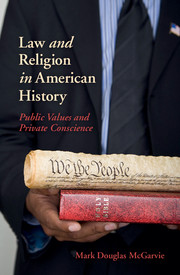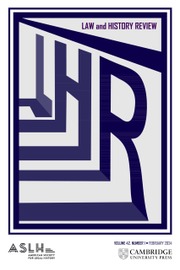Law and Religion in American History
This book furthers dialogue on the separation of church and state with an approach that emphasizes intellectual history and the constitutional theory that underlies American society. Mark Douglas McGarvie explains that the founding fathers of America considered the right of conscience to be an individual right, to be protected against governmental interference. While the religion clauses enunciated this right, its true protection occurred in the creation of separate public and private spheres. Religion and the churches were placed in the private sector. Yet, politically active Christians have intermittently mounted challenges to this bifurcation in calling for a greater public role for Christian faith and morality in American society. Both students and scholars will learn much from this intellectual history of law and religion that contextualizes a four-hundred-year-old ideological struggle.
- Focuses on constitutional theory, not First Amendment as its basis for separation of church and state, so readers can appreciate the roots of US independence more fully
- Recognizes Christianity as a basis for political movements, so readers can see politically motivated Christians in historical context with diverse allies
- Identifies diminution of individual rights as a product of pragmatism, legal positivism, and Christian political action, so readers can see contemporary issues in a new light
Reviews & endorsements
"In Law and Religion in American History, Mark McGarvie makes a persuasive case for his arresting argument that the ongoing effort to Christianize America by government fiat has never been very American, nor even very Christian."
Woody Holton, Bancroft Prize-winning author of Abigail Adams
"Mark McGarvie's book is a splendidly illuminating historical synthesis of Americans' struggle to reconcile two of the most powerful and compelling ideological forces in their history. It is a major achievement, simultaneously expansive in its conceptual reach and sharply focused in its method."
David Konig, Washington University, St Louis
"McGarvie deftly documents how Americans have and have not learned to reconcile the contradictions between their practices and ideals. With Law and Religion in American History, he clearly establishes himself as one of the preeminent scholars on the intersections of American law and religion."
J. D. Bowers, Director, Honors College, University of Missouri
"It is high time for a broad, historically informed reconsideration of law and religion in American history, and Mark McGarvie has given us just that. This book will enlighten its readers and provoke further conversation about social responsibility and individual liberty in American life."
Mark Valeri, Reverend Priscilla Wood Neaves Distinguished Professor of Religion and Politics, John C. Danforth Center on Religion and Politics, Washington University, St Louis
"In a tale full of irony and strange bedfellows, McGarvie gracefully guides us through the law's efforts to limit or to expand religion's public role as Americans struggled - and still struggle - to define their civil religion in an increasingly diverse society. A must-read."
Johann N. Neem, author of Creating a Nation of Joiners
'McGarvie argues that the US founders considered the right of conscience to be an individual right, to be protected against governmental interference. While the religion clauses enunciated this right, its true protection occurred in the creation of separate public and private spheres, with religion in the private sector. Yet, politically active Christians have intermittently mounted challenges to this bifurcation, calling for a greater public role for Christian faith and morality in American society.' Law and Social Inquiry
'An important, ambitious effort. Synthesizing a history of this topic requires expertise in (at least) three different subfields: the history of American law, the history of American religion, and American intellectual history. Given the contentiousness surrounding the question of freedom of religion today, we surely have need of such a work. Enlightening and stimulating …' Mary K. Cayton, H-Net
'This book provides a timely and tightly focused study of the many ways in which politically active Christians have attempted to influence public policy since the founding of the Republic, and the manner in which courts have responded to such efforts. Highly Recommended.' William G. Ross, Journal of Church and State
Product details
June 2016Adobe eBook Reader
9781316685228
0 pages
0kg
7 b/w illus.
This ISBN is for an eBook version which is distributed on our behalf by a third party.
Table of Contents
- Introduction
- 1. Prologue: colonial America perpetuates state religion
- 2. Revolution in thought and social organization: the legal
- hegemony of Jeffersonian liberalism, 1776–1828
- 3. A Christian counter-revolution and a new vision of American society, 1828–65
- 4. Regulating behavior and teaching morals: the uses of religion, 1865–1937
- 5. The rights revolution, 1937–2014
- 6. Epilogue: the significance of history and a reconsideration of original intent
- Bibliographic essay
- Index.




